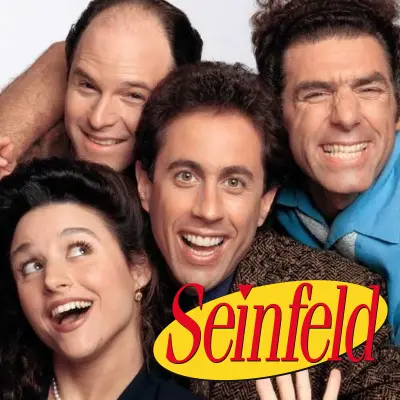Seinfeld on Netflix is the anti-binge show, but it sometimes can be surprisingly prescient
-

"Seinfeld is like the anti-binge show, a series very much designed to be watched amid all the other crap on TV on a Thursday night," says Sonia Saraiya of the hit NBC comedy, which joined Netflix last month. "In single half-hour chunks, its characters are like a balm, implicitly forgiving you for every unkind word you’ve considered saying, for every time you ranked getting laid over showing up for your loved ones. But for more than a few episodes at a time, these people and their concerns—so self-absorbed, so entitled, so stupid—are a little deadening to watch." Saraiya says Seinfeld is more enjoyable to watch on Netflix simply because many others are also check it out, too. "At the same time, the show is sometimes weirdly prescient, especially about the future of TV. The entire fourth season, which showcases George and Jerry selling their pilot of a show about nothing to NBC, feels to me like the beginning of the end of network television," says Saraiya. "It has a snake-eating-its-own-tail meta quality that is both brilliant and supremely weird—and seems to serve as a vehicle for the show’s veiled critiques of its own sausage-making process. When NBC head Russell Dalrymple (Bob Balaban) leaves the TV business to join Greenpeace to impress Elaine (who, among her other disjointed character traits, is sort of an activist?), it feels like a harbinger of things to come. But if network TV were dead, maybe it wouldn’t be so damn watchable. I have Seinfeld on DVD somewhere, but it’s not really the same; one of the reasons I’m watching Seinfeld now, on Netflix, is because I know others are watching it too. Seinfeld is like an extraordinary device that communicates the things about humanity we are most ashamed to acknowledge. Shame is a social emotion; it requires other people to function. Seinfeld is a show that is dramatically enhanced when shared with a viewing audience, even if it’s just an implied one. It’s imperfect, watching a broadcast show 30 years later on a streaming platform—but it’s either this or TBS reruns of Seinfeld, and those don’t seem to have quite the same reach. Maybe society has changed a little since the heyday of Seinfeld. But in the last few decades, the sitcom—and how we watch it—has changed entirely."
TOPICS: Seinfeld, Netflix, Retro TV
More Seinfeld on Primetimer:- When is Festivus celebrated? Details analyzed on how to celebrate the holiday
- Who was Al Bevilacqua? Wrestling coach known for Seinfeld passes away at 85
- Rewatching Seinfeld made me see Elaine differently — she might be the most honest character on TV
- Stealing Boggle Trophies: When Celebrities Take on the Villain Cameo
